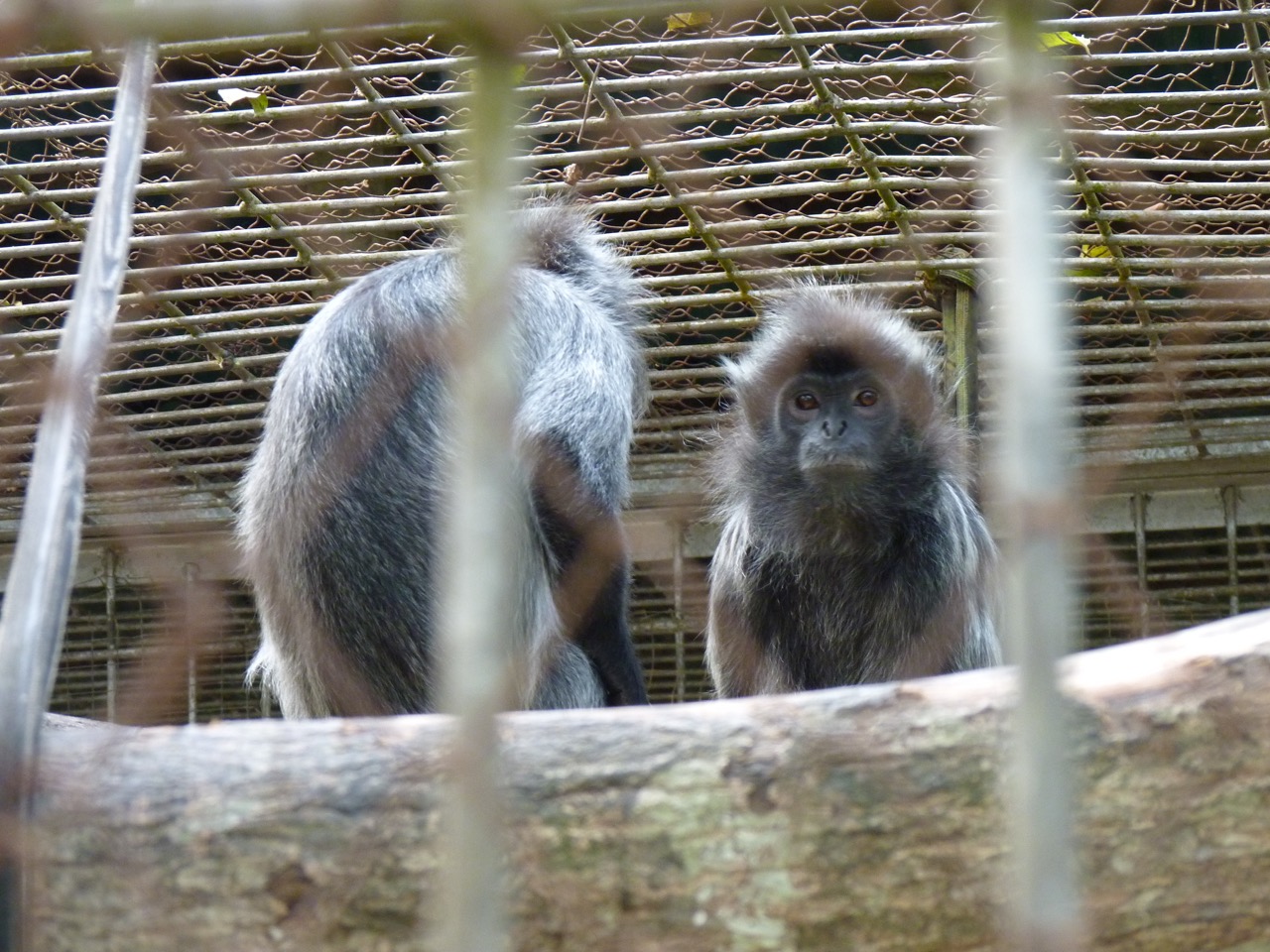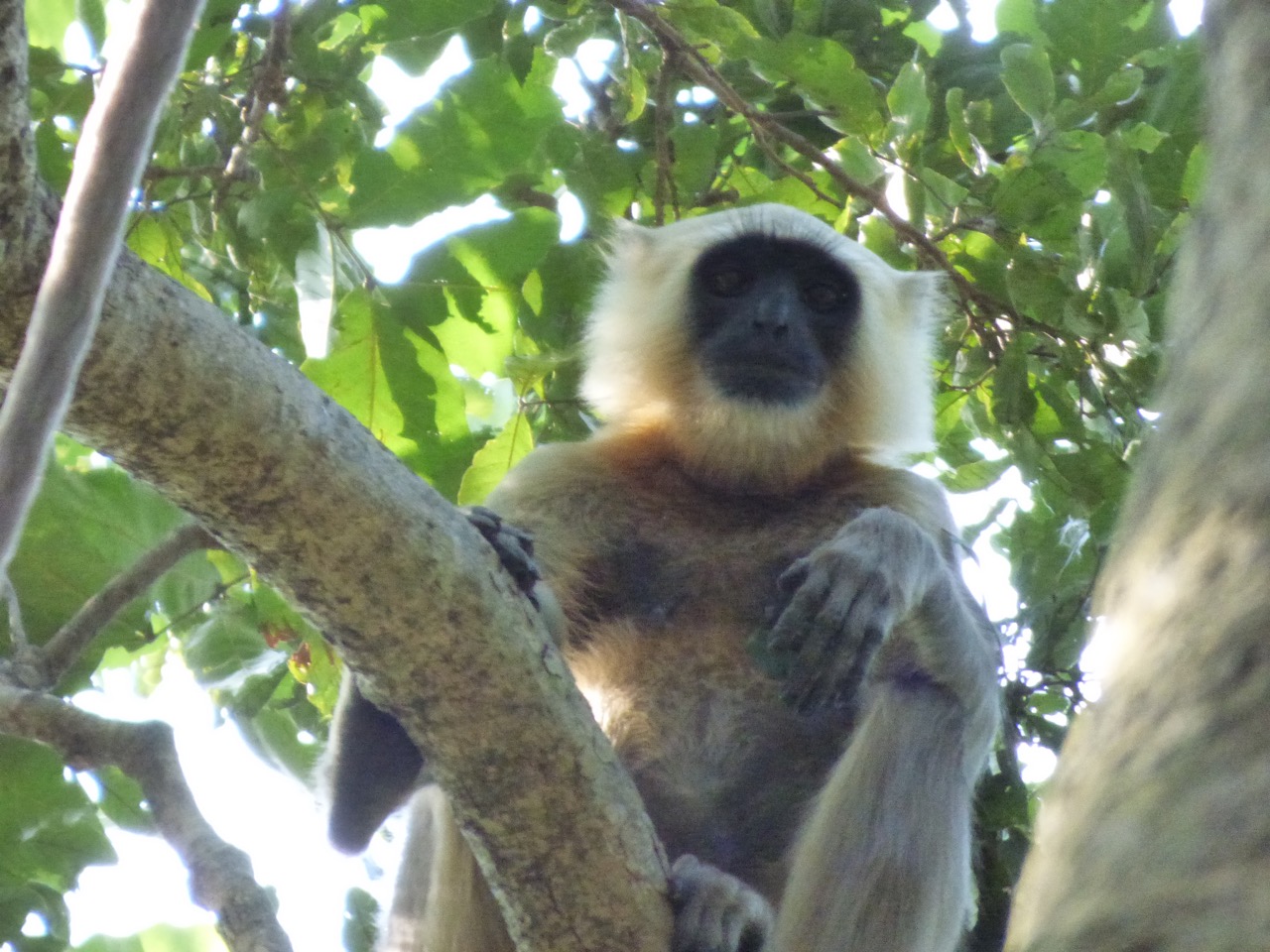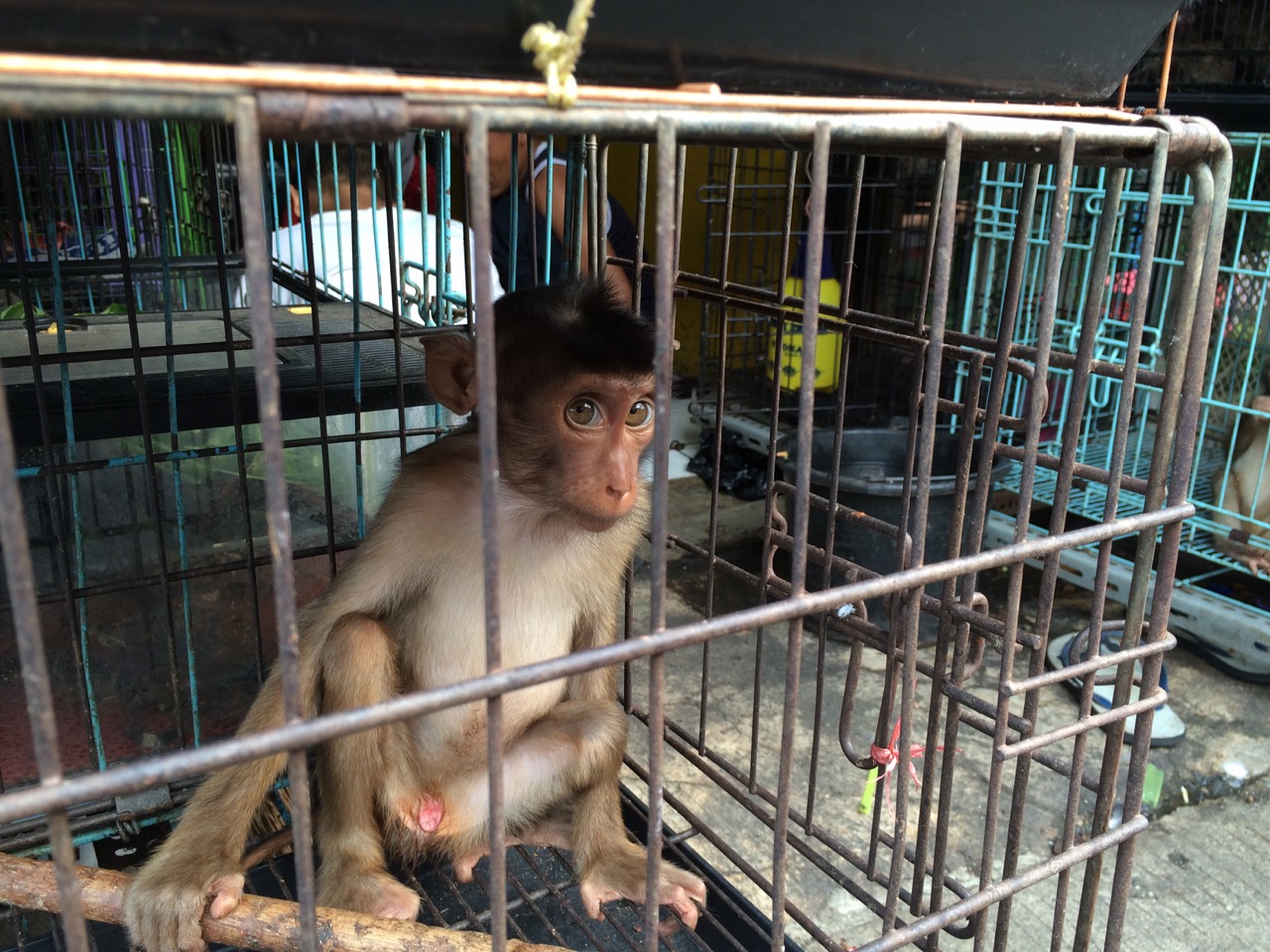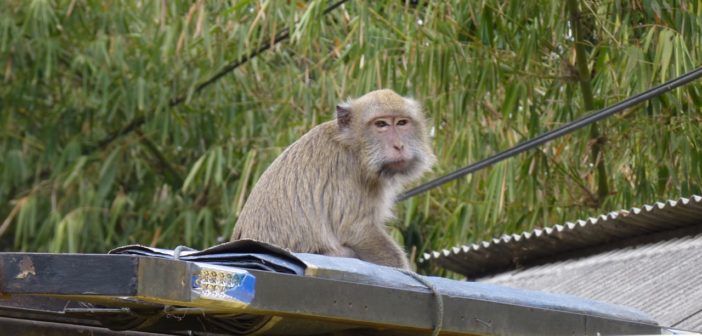Recently, I came across a young lady carrying an infant Trachypithecus obscurus (commonly known as a spectacled langur or dusky langur) in the mall! My family and I were just coming out from the cinema after watching a movie when it happened. My brother spotted the lady carrying the monkey when she was going up the escalator and while we were going down, so I immediately went back up to confront her. That lady was holding the little baby who was using pampers.
So here is my question: what is a wild animal doing in the mall?

Langurs, likely rescued from the pet trade, at Cikananga Rescue Centre in Java, Indonesia. Photo courtesy Wolf Gordon Clifton / Animal People, Inc.
I have basic experience in primate care, especially with ones who have been victims of wildlife trade in Indonesia, and this was what I did. I approached her, and those who were standing with her left her standing alone to talk to me. I asked her, “Anak monyet ini dapat dari mana?” (Where did you obtain this baby monkey?) and she replied “Saya beli dari petshop di Kuantan” (It was from a pet store in Kuantan). I watched the little orange langur quietly hugging himself close to her without moving much. I thought to myself, this was the stereotype behaviour that primates do when they are stressed.
My next question was, “Kamu nak simpan dia sampai bila?” (Until when will you keep it as a pet?). Her reply was “sampai dia besar la” (until he is a grown monkey). I asked in my mind, do you know what will happen when he grows and is still kept as a pet? I knew exactly what will happen, as I have heard stories from my wildlife rescue friends and of course, I was a volunteer myself in a wildlife rehabilitation centre in Indonesia.
While I was talking to her, she got a little uncomfortable and started backing up slowly. So I told her before she walked away:
“Awak tak payah takut, saya cuma nak kasi tahu awak, kalo nanti dia besar susah jaga kerana dia itu hewan liar dan kalau pun awak sayang dia macam ini, janganlah bawa dia pergi mall macam ini, dia tu kecil lagi dan pasti stres tau. Saya tahu kerana saya ada pengalaman kerja dengan hewan macam ini. Lain kali jangan buat macam ini.”
(You don’t have to be scared because I just want to let you know, when he grows big it will be hard since he is a wild animal and even if you love him, don’t bring him out to a mall because he is small and will get stressed easily. I know because I have experience working with animals like this, and please do not do this anymore)
She speechlessly smiled, nodded and walked away. I did not take a picture of the situation, because that would cause a public offense. But the memory continues to stick in my mind.
I can approach the incident from two perspectives. The first would be as a wildlife rehabilitator and animal lover. That poor baby langur! Was he a victim of wildlife trade? If she was telling the truth that she got him from the pet shop, where did they get him from? Is it legal to sell wild animals such as that baby langur in Malaysia? Because I know for a fact that it is not common, and it is almost impossible to breed these animals in captivity to be sold as pets. Baby primates need 24 hour around the clock care. Every two hours they need milk. What type of milk is she giving the infant langur? Because cow’s milk can cause diarrhoea due to them being lactose intolerant, and it is not advisable to give them human milk products. They need a specific milk formula.

Wild Hanuman langur in Bardia National Park, Nepal. Photo courtesy Wolf Gordon Clifton / Animal People, Inc.
In the wild, the babies would cling on to their mother until about six months old before they start eating solid food. Typically, people just feed monkeys bananas, even though that is not their entire natural diet. People purchase them as pets while they are young, cute and cuddly. Unfortunately, primates do not stay that way for long. They grow rapidly, requiring the owner to soon get a larger cage. Babies like the langur in the mall won’t be cuddly when they are adults. They are wild animals, and eventually their wild side will kick in. Will you then still be so sure of keeping them as a pet? They will start exercising their natural behaviour, and because they have never seen another of their kind, they will grow up confused and lost as to how their species should act.
Eventually, when they cannot be handled anymore, you will have to turn them in somewhere. If a zoo or other wildlife centre takes them in, they will have to care for them their whole lives, because a domesticated wild animal is a dead animal in the wild. They cannot and will not survive in nature. They won’t know how to climb trees or find their own food in the wild. These particular species are social animals who live in groups. You cannot simply introduce them back to the wild hoping they will find a new group to help them survive. Taking a wild animal, especially a primate, from the wild and expecting them to behave like a domestic pet is wrong on all levels.
The second way I can approach the incident is from a veterinary perspective. Bringing a non-human primate into a public space is just wrong! They are not plush toys. Scientifically, we humans are primates too. What viruses primates carry, we are susceptible to as well. If they have flu, we can and most definitely will get their flu too. Human Immunodeficiency Virus (HIV) evolved from Simian Immunodeficiency Virus (SIV) which was once only found in wild primates. We at the rehabilitation centre use masks when we attend to or handle primates, to prevent us from contracting any sickness or illness primates carry and vice versa. Here, in this situation, what is the barrier preventing those illnesses or sicknesses from passing and spreading around in public?
Additionally, primate babies that small are prone to high levels of stress. I noticed the little one looking confused and hugging itself. What if the situation got out of hand and he attacked someone out of self defense or because he was scared? Who would bear the blame? This is not the right way for people to interact with wild animals. It is a public health threat to bring any wild animal, especially a primate, to the mall.
We need to be aware of our surroundings, and recognize that wild animals like primates are not pets to be carried around in public. According to the Wildlife Conservation Act 2010 (At 716), Trachypitherus obscurus is a protected species under Malaysian law. How are we allowing them to be sold as pets? The International Union for Conservation of Nature (IUCN) Red List has listed it as a species that is Near Threatened.
I think awareness of the harms and risks involved in situations like these matters the most. People and the public need to be educated of the dangers and outcomes of keeping primates as pets. We need to ask ourselves a few questions before getting a wild animal such as that. Where did they come from? How did they end up in the pet shop? Once they are a grown adult, will you still be able and willing to take care of them? Especially when the wild side of the animal starts to show?

Baby macaque sold in Jatinegara Market, Jakarta, Indonesia. Image courtesy Wolf Gordon Clifton / Animal People, Inc.
We must be mature and responsible enough to consider how these animals end up sold as pets. We cannot let ourselves stay ignorant. For all you know, the poor baby could have seen their mother killed by poachers, just to feed your satisfaction of owning them as a pet! Just imagine yourself as a small, innocent and helpless creature. Is that a pretty feeling?
Buying wild animals as pets is wrong. To take a little dusky langur from the wild is to kill all the adults who protect them. It disrupts the ecosystem and food chain. It feeds the illegal wildlife trade industry that entraps beautiful animals in captivity, while destroying their species’ existence in nature.
Animals have always been my subject of interest. I love animals, but I strongly believe that wild animals should not be kept as pets. They need to be free and wild. That is what it means to respect and coexist with animals.
As Mahatma Gandhi once said, “the greatness of a nation and its moral progress can be judged by the way its animals are treated”. So please stop being ignorant, and start being aware of the animals that we share this planet with.
Featured image: pet macaque (not a langur) chained to truck in Java, Indonesia. Image courtesy Wolf Gordon Clifton / Animal People, Inc.





